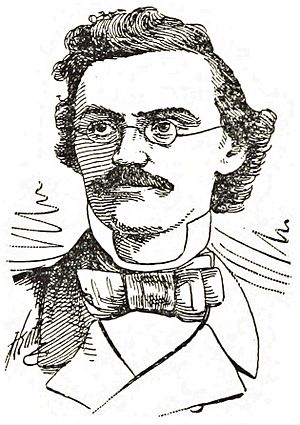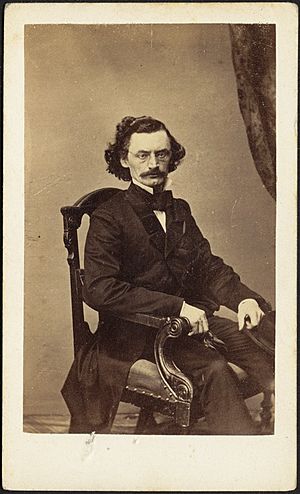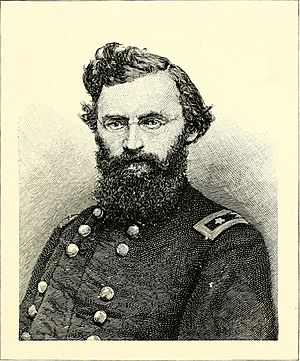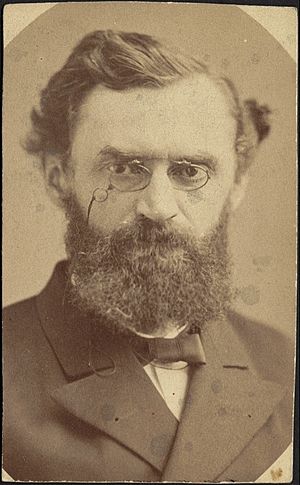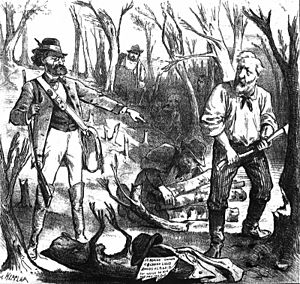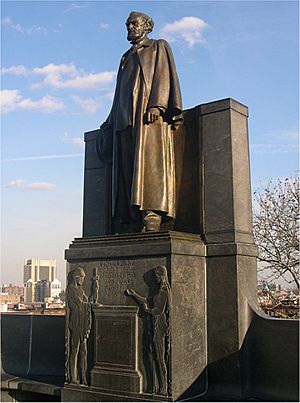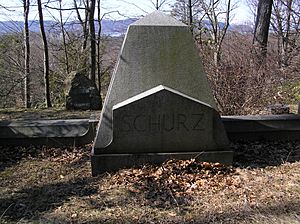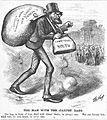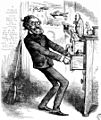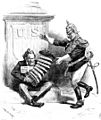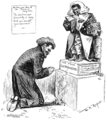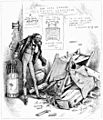Carl Schurz facts for kids
Quick facts for kids
Carl Schurz
|
|
|---|---|
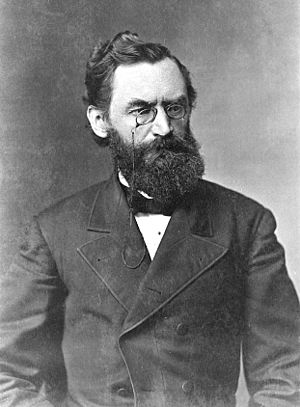
Schurz photographed by Mathew Brady, c. 1877
|
|
| 13th United States Secretary of the Interior | |
| In office March 12, 1877 – March 7, 1881 |
|
| President | Rutherford B. Hayes |
| Preceded by | Zachariah Chandler |
| Succeeded by | Samuel J. Kirkwood |
| United States Senator from Missouri |
|
| In office March 4, 1869 – March 3, 1875 |
|
| Preceded by | John B. Henderson |
| Succeeded by | Francis Cockrell |
| United States Minister to Spain | |
| In office July 13, 1861 – December 18, 1861 |
|
| President | Abraham Lincoln |
| Preceded by | William Preston |
| Succeeded by | Gustav Körner |
| Personal details | |
| Born |
Carl Christian Schurz
March 2, 1829 Liblar, Rhine Province, Kingdom of Prussia, German Confederation (now Erftstadt) |
| Died | May 14, 1906 (aged 77) New York City, U.S. |
| Political party | Republican |
| Other political affiliations |
Liberal Republican (1870–1872) |
| Spouse | Margarethe Meyer |
| Education | University of Bonn (BA) |
| Signature |  |
| Military service | |
| Allegiance | German revolutionaries United States |
| Branch/service | United States Volunteers (Union Army) |
| Years of service | 1848 1862–1865 |
| Rank | Major general |
| Battles/wars | German revolutions of 1848–49 American Civil War (1861–1865) |
Carl Schurz (born March 2, 1829 – died May 14, 1906) was a very important person who was both a German revolutionary and an American leader. He was also a journalist and a reformer. He came to the United States after a revolution in Germany in 1848. In America, he became a key member of the new Republican Party.
During the American Civil War, he was a general for the Union Army. Later, he helped start the Liberal Republican Party, which didn't last long. Schurz was a strong supporter of making government jobs fair and based on skill, not just political connections. He represented Missouri in the United States Senate and was also the 13th United States Secretary of the Interior.
Born in the Kingdom of Prussia's Rhine Province, Schurz fought for democratic changes in the German revolutions of 1848–1849 as a student. After the revolution was stopped, Schurz fled to France. When police made him leave France, he moved to London. Like many other "Forty-Eighters" (people who left Europe after the 1848 revolutions), he then moved to the United States. He settled in Watertown, Wisconsin, in 1852.
After becoming a lawyer in Wisconsin, he started his own law practice in Milwaukee. He also became a strong supporter of ending slavery and joined the new Republican Party. He ran for Lieutenant Governor of Wisconsin but did not win. After briefly serving as the U.S. ambassador to Spain, Schurz fought as a general in the American Civil War. He was part of important battles like the Battle of Gettysburg.
After the war, Schurz started a newspaper in St. Louis, Missouri. He was then elected to the U.S. Senate. He was the first German-born American to be elected to that position. Schurz disagreed with Republican President Ulysses S. Grant on some issues. He helped create the Liberal Republican Party. This party wanted government jobs to be given based on merit, not political favors. They also supported lower taxes and opposed some of Grant's actions during Reconstruction.
Schurz led the 1872 Liberal Republican convention, which chose a candidate to run against President Grant in the 1872 United States presidential election. Their candidate lost. Schurz also lost his re-election for the Senate in 1874. He then went back to being a newspaper editor. In 1878, he became a member of the American Philosophical Society.
When Republican Rutherford B. Hayes won the 1876 United States presidential election, he made Schurz his Secretary of the Interior. Schurz worked to make government jobs fair and based on skill. He also helped stop the Bureau of Indian Affairs from being moved to the War Department. After Hayes left office in 1881, Schurz moved to New York City. He worked as an editor for newspapers like the New York Evening Post and The Nation. Later, he wrote editorials for Harper's Weekly.
He stayed active in politics and led a group called the "Mugwumps". This group opposed James G. Blaine becoming president in the 1884 United States presidential election. Schurz also disagreed with William Jennings Bryan's ideas about money in the 1896 United States presidential election. However, he supported Bryan's campaign against imperialism in the 1900 United States presidential election. Carl Schurz died in New York City in 1906.
Contents
Early Life and Education
Carl Christian Schurz was born on March 2, 1829, in Liblar (now part of Erftstadt), in Rhenish Prussia, Germany. His mother, Marianne, was a public speaker and journalist, and his father, Christian, was a schoolteacher. Carl studied at a school in Cologne and learned to play the piano.
Because of money problems in his family, he had to leave school a year early. However, he later passed a special exam and was able to attend the University of Bonn.
Fighting for Freedom in Germany
At the University of Bonn, Carl Schurz became good friends with one of his professors, Gottfried Kinkel. They both joined a student group called Burschenschaft Franconia at Bonn. When the revolutions of 1848 began, Schurz and Kinkel started a newspaper called Bonner Zeitung. This paper supported democratic changes. Kinkel was the editor, and Schurz wrote many articles.
When a German parliament called for people to fight for a new German constitution, Schurz, Kinkel, and other students joined the fight. Schurz met many people during this time, like Franz Sigel and Alexander Schimmelfennig. Many of these people would later fight alongside him in the American Civil War.
During a military campaign in 1849, Schurz joined the revolutionary army. He fought in several battles against the Prussian Army. When the revolutionary army was defeated at the fortress of Rastatt in 1849, Schurz was trapped inside. He knew the Prussians might kill their prisoners, so Schurz managed to escape and went to Zürich.
In 1850, he secretly returned to Prussia. He bravely rescued Kinkel from prison and helped him escape to Edinburgh, Scotland. Schurz then went to Paris, but the police made him leave France. He then moved to London and stayed there until August 1852, earning a living by teaching the German language.
Moving to America
While in London, Schurz married Margarethe Meyer in July 1852. Like many other "Forty-Eighters" (people who left Europe after the 1848 revolutions), they moved to the United States. They first lived in Philadelphia, Pennsylvania. Then, the Schurzes moved to Watertown, Wisconsin. Here, Carl became very interested in politics, and Margarethe started important work in early childhood education.
In Wisconsin, Schurz quickly became involved in the movement to end slavery and in politics. He joined the Republican Party. In 1857, he ran for lieutenant governor as a Republican but did not win. In 1858, he became a lawyer in Milwaukee.
In 1858, during the election campaign in Illinois between Abraham Lincoln and Stephen A. Douglas, Schurz spoke for Lincoln. He often spoke in German, which helped Lincoln gain support from German-American voters. Schurz became more interested in politics and public speaking than in law. In 1859, he gave a speech criticizing the Fugitive Slave Law. He also gave a famous speech in Boston called "True Americanism," explaining that the Republican Party was not against immigrants.
In 1861, after Lincoln was elected president, he sent Schurz to be the U.S. ambassador to Spain. While there, Schurz quietly convinced Spain not to support the Southern states during the American Civil War.
American Civil War Hero
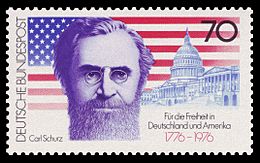
During the American Civil War, Schurz served bravely as a general in the Union Army. He convinced Lincoln to make him a brigadier general in April 1862. In June, he took command of a division. He fought in the Second Battle of Bull Run in August 1862.
He was promoted to major general in 1863. He led a division in the XI Corps at the battles of Chancellorsville and Gettysburg. The XI Corps, which had many German-American soldiers, faced criticism after these battles.
After Gettysburg, Schurz's division moved to Tennessee and fought in the Battle of Chattanooga. Later, he was in charge of a training corps in Nashville, Tennessee. In the last months of the war, he served with Sherman's army in North Carolina. He left the army after the war ended in April 1865.
In the summer of 1865, President Andrew Johnson sent Schurz to the South to see how things were. Schurz wrote a report for the U.S. Senate. He said that while the government was working again, people in the South were not fully loyal. He also reported that the newly freed African Americans were still treated unfairly and faced violence. Schurz believed the government needed to stay in control of the South to protect these rights. The President ignored his report, but it helped push Congress to take a bigger role in Reconstruction.
Newspaper Career and Senate Election
In 1866, Schurz moved to Detroit, where he was the main editor of the Detroit Post. The next year, he moved to St. Louis. There, he became an editor and owner of a German-language newspaper called Westliche Post. He even hired Joseph Pulitzer as a young reporter. In 1867–1868, he traveled in Germany and met Otto von Bismarck.
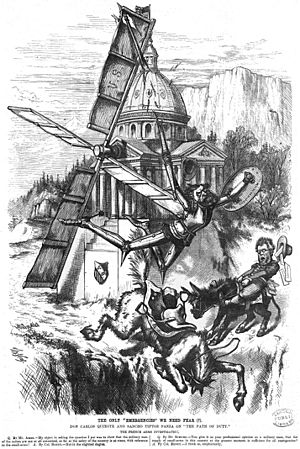
In 1868, Carl Schurz was elected to the United States Senate from Missouri. He was the first German American to serve in the Senate. He became known for his speeches, which focused on being careful with government money, avoiding taking over other countries, and having honest government. During this time, he disagreed with President Ulysses S. Grant's administration. He started the Liberal Republican movement in Missouri.
Schurz became a member of the Committee on Foreign Affairs. He opposed Grant's policies in the South and his plan to take over Santo Domingo. In 1869, he was the first U.S. Senator to propose a bill for Civil Service Reform. This meant that government jobs should be given based on skill, not political favors. During Reconstruction, Schurz believed that the federal government should not use military force to protect African American civil rights.
In 1870, Schurz helped form the Liberal Republican Party. This party was against President Grant's plan to annex Santo Domingo. They also opposed Grant's use of the military to fight the Ku Klux Klan in the South. In 1872, Schurz led the Liberal Republican Party convention. They chose Horace Greeley to run for President. Schurz campaigned for Greeley, but Grant won the election by a large margin.
Schurz lost his Senate re-election in 1874. After leaving office, he worked as an editor for different newspapers.
Secretary of the Interior
In 1876, Schurz supported Rutherford B. Hayes for President. When Hayes won, he appointed Schurz as his Secretary of the Interior. In this role, Schurz put his beliefs into action. He wanted government jobs to be given based on merit and skill, not political connections. He tried to stop people from being removed from their jobs without a good reason. He also supported requiring tests for people applying for government jobs. His efforts to reduce political favoritism had some success.
Schurz was also an early supporter of protecting nature. He went after people who stole land and brought public attention to the need to save forests.
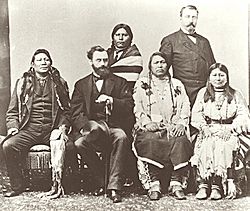
During Schurz's time as Secretary of the Interior, some people wanted to move the Bureau of Indian Affairs to the control of the War Department. This was supported by General William Tecumseh Sherman. Schurz opposed this idea, and the Indian Office stayed in the Interior Department. The Indian Office had been known for corruption. Schurz worked to clean it up by inspecting the service, firing some officials, and starting reforms to base jobs and promotions on merit.
Schurz's leadership of the Indian Affairs Office was sometimes debated. While he did not start the policy of moving Native Americans, he continued it. However, he later changed his mind and supported policies that aimed to help Native Americans adapt to American society.
Later Life and Legacy
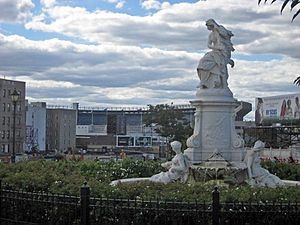
After leaving the Interior Department in 1881, Schurz moved to New York City. That year, Henry Villard bought the New York Evening Post and The Nation. He put Schurz, Horace White, and Edwin Lawrence Godkin in charge. Schurz left the Post in 1883 because of disagreements about how to write about businesses and their workers.
In 1884, he was a leader in the Independent (or Mugwump) movement. This group opposed James G. Blaine for president and supported Grover Cleveland. From 1888 to 1892, he worked as a representative for the Hamburg American Steamship Company. In 1892, he became president of the National Civil Service Reform League and held this job until 1901. He also became an editorial writer for Harper's Weekly from 1892 to 1898.
He opposed William Jennings Bryan for president in 1896. However, he supported Bryan four years later in the 1900 election because of his beliefs against imperialism. Schurz died at age 77 on May 14, 1906, in New York City. He is buried in Sleepy Hollow Cemetery, Sleepy Hollow, New York.
Schurz's wife, Margarethe Schurz, was very important in starting the kindergarten system in the United States.
Carl Schurz is famous for saying: "My country, right or wrong; if right, to be kept right; and if wrong, to be set right."
He was played by Edward G. Robinson in the 1964 film Cheyenne Autumn.
Works and Writings
Schurz published a book of his speeches in 1865. He also wrote a two-volume biography of Henry Clay (1887), essays about Abraham Lincoln (1899), and Charles Sumner (published after his death in 1951). His later years were spent writing his Reminiscences, which are his memories. He was not able to finish them, only reaching the beginning of his time in the U.S. Senate.
Memorials and Honors
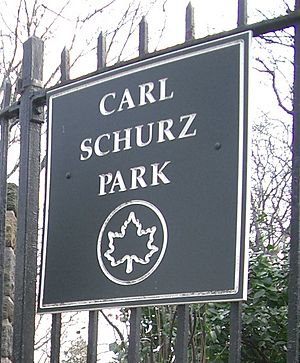
Many places in the United States remember Carl Schurz:
- Carl Schurz Park, a 14.9-acre (6.0 ha) park in New York City, next to Yorkville, Manhattan. It is the home of Gracie Mansion, where the Mayor of New York lives.
- A monument to Schurz by Karl Bitter from 1913 is outside Morningside Park in New York City.
- Another monument by Karl Bitter from 1914 is in Menominee Park, Oshkosh, Wisconsin.
- Carl Schurz Drive, a street in his former home of Watertown, Wisconsin.
- Schurz Elementary School, in Watertown, Wisconsin.
- Carl Schurz High School, a historic building in Chicago, built in 1910.
- Schurz Hall, a student dorm at the University of Missouri.
- Carl Schurz Elementary School in New Braunfels, Texas.
- Mount Schurz, a mountain in Yellowstone National Park, named in 1885 to honor Schurz's work to protect the park.
- In 1983, the U.S. Postal Service released a postage stamp with his picture.
- The USS Schurz was a ship commissioned in 1917. It was originally a German ship that the U.S. Navy took over.
Several memorials in Germany also honor Carl Schurz:
- Carl-Schurz Kaserne, a military base in Bremerhaven.
- Streets named after him in cities like Berlin-Spandau, Bremen, Stuttgart, Cologne, and his birthplace, Erftstadt-Liblar.
- Schools in Bonn, Bremen, Berlin-Spandau, Frankfurt am Main, and Rastatt.
- The Carl-Schurz-Haus Freiburg, in Freiburg im Breisgau, which promotes German-American cultural relations.
- German federal stamps were issued in his honor in 1952 and 1976.
Images for kids
-
Schurz is depicted as a carpetbagger - November 9, 1872.
-
Schurz and Wilhelm II – July 14, 1900
-
Schurz and Emilio Aguinaldo – August 9, 1902
See also
 In Spanish: Carl Schurz para niños
In Spanish: Carl Schurz para niños
- List of foreign-born United States Cabinet members
- List of American Civil War generals (Union)
- Forty-Eighters
- German Americans in the Civil War
- German Americans
- German-American Heritage Foundation of the USA
- List of United States senators born outside the United States
 | Lonnie Johnson |
 | Granville Woods |
 | Lewis Howard Latimer |
 | James West |


